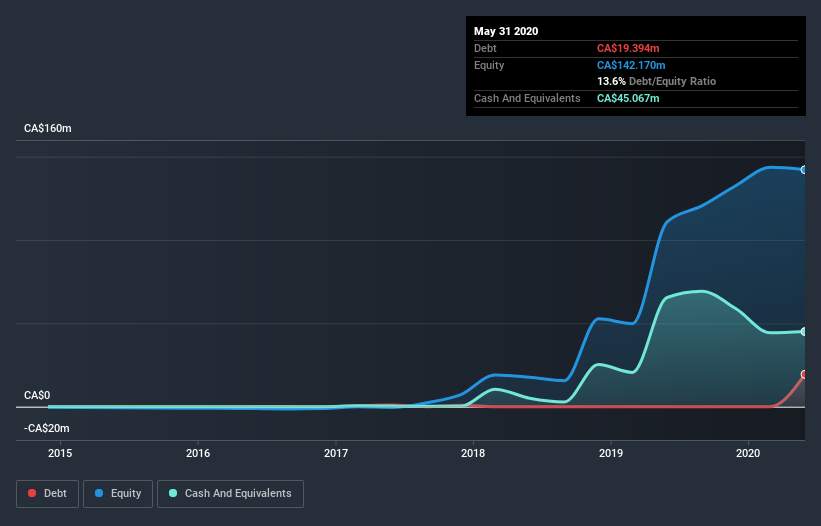Is Valens (TSE:VLNS) Using Too Much Debt?

Some say volatility, rather than debt, is the best way to think about risk as an investor, but Warren Buffett famously said that 'Volatility is far from synonymous with risk.' So it might be obvious that you need to consider debt, when you think about how risky any given stock is, because too much debt can sink a company. As with many other companies The Valens Company Inc. (TSE:VLNS) makes use of debt. But the real question is whether this debt is making the company risky.
When Is Debt Dangerous?
Generally speaking, debt only becomes a real problem when a company can't easily pay it off, either by raising capital or with its own cash flow. Part and parcel of capitalism is the process of 'creative destruction' where failed businesses are mercilessly liquidated by their bankers. However, a more usual (but still expensive) situation is where a company must dilute shareholders at a cheap share price simply to get debt under control. Having said that, the most common situation is where a company manages its debt reasonably well - and to its own advantage. When we examine debt levels, we first consider both cash and debt levels, together.
Check out our latest analysis for Valens
What Is Valens's Debt?
You can click the graphic below for the historical numbers, but it shows that as of May 2020 Valens had CA$19.4m of debt, an increase on none, over one year. But on the other hand it also has CA$45.1m in cash, leading to a CA$25.7m net cash position.
How Strong Is Valens's Balance Sheet?
The latest balance sheet data shows that Valens had liabilities of CA$29.0m due within a year, and liabilities of CA$30.1m falling due after that. Offsetting these obligations, it had cash of CA$45.1m as well as receivables valued at CA$36.0m due within 12 months. So it actually has CA$21.9m more liquid assets than total liabilities.
This short term liquidity is a sign that Valens could probably pay off its debt with ease, as its balance sheet is far from stretched. Simply put, the fact that Valens has more cash than debt is arguably a good indication that it can manage its debt safely.
It was also good to see that despite losing money on the EBIT line last year, Valens turned things around in the last 12 months, delivering and EBIT of CA$18m. When analysing debt levels, the balance sheet is the obvious place to start. But ultimately the future profitability of the business will decide if Valens can strengthen its balance sheet over time. So if you want to see what the professionals think, you might find this free report on analyst profit forecasts to be interesting.
Finally, while the tax-man may adore accounting profits, lenders only accept cold hard cash. Valens may have net cash on the balance sheet, but it is still interesting to look at how well the business converts its earnings before interest and tax (EBIT) to free cash flow, because that will influence both its need for, and its capacity to manage debt. During the last year, Valens burned a lot of cash. While investors are no doubt expecting a reversal of that situation in due course, it clearly does mean its use of debt is more risky.
Summing up
While it is always sensible to investigate a company's debt, in this case Valens has CA$25.7m in net cash and a decent-looking balance sheet. So we are not troubled with Valens's debt use. The balance sheet is clearly the area to focus on when you are analysing debt. However, not all investment risk resides within the balance sheet - far from it. Case in point: We've spotted 4 warning signs for Valens you should be aware of, and 1 of them is significant.
Of course, if you're the type of investor who prefers buying stocks without the burden of debt, then don't hesitate to discover our exclusive list of net cash growth stocks, today.
This article by Simply Wall St is general in nature. It does not constitute a recommendation to buy or sell any stock, and does not take account of your objectives, or your financial situation. We aim to bring you long-term focused analysis driven by fundamental data. Note that our analysis may not factor in the latest price-sensitive company announcements or qualitative material. Simply Wall St has no position in any stocks mentioned.
Have feedback on this article? Concerned about the content? Get in touch with us directly. Alternatively, email editorial-team@simplywallst.com.

 Yahoo Finance
Yahoo Finance 
